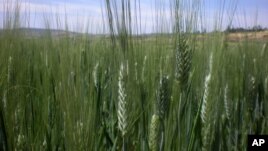12 January, 2015
51VOA听写整理,转载请注明出处。文本仅供参考,欢迎纠错!
This is the VOA Learning English Agriculture Report.
The U.S. is awarding $15,000 each to five pairs of U.S. and Ethiopian universities for research and development projects.
One partnership is between the University of Maryland and Debre Birhan University, in Ethiopia. The partners will use the money to train Ethiopian women to grow crops throughout the year. They will teach students in both classrooms and on farms. Their goal is to help Ethiopia fight food insecurity.
The U.S. Agency for International Development says women perform up to 75 percent of all farm labor in Ethiopia, that represents 70 percent of household food production. But these women often produce up to 35 percent less than male farmers, because they receive less help.

This photo taken Wednesday, Oct. 10, 2012, shows the wheat farm near Debre Zeit, in Ethiopia's Amhara region.
Becky Ramsing is an advisor at the University of Maryland. She says she hopes the program will help women in Ethiopia who might not have any other way to get training.
"If you give the woman the resources those resources will directly go to the family. And when women are given added income or are able to raise more food, that directly relates to the children and the education and nutrition of the child," Ramsing said.
Ms. Ramsing says the program will first train teachers and officials at Debre Birhan University. Then, those teachers and officials will teach women useful farming skills, such as how to grow food in small places.
"Some of these women don't have access to land. How can we do container gardening and vertical gardening, livestocks like small poultry?"Ramsing said.
Tsigemariam Bashe is an official of Debre Birhan university. Ms. Bashe says the program aims to do more than teach farming. The larger purpose, she says, is to help women care for themselves and their families.
"Empowering women is empowering the whole population or empowering the society," Bashe said.
Hailu Terefe also works at Debre Birham. He says in some parts of the country only men are taught how to farm.
"There is cultural differences in Ethiopia. All of the regions do not have the same culture. There are regions that women are not allowed to go for agricultural practices," Terefe said.
Tsigemariam Bashe hopes the women who are trained will then train other women.
"I hope, I hope in the near future womens in the project becomes the community educator," Bashe said.
Four other American universities received awards for research and development partnerships. The U.S. State Department and Department of Education gave the awards, in part, to strengthen the abilities of teachers and school officials in both the U.S. and Ethiopia.
And that's the VOA Learning English Agriculutre Report. I'm Marsha James.